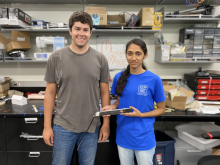
Major:
University:
Mentor(s):
Faculty Sponsor(s):
Faculty Sponsor's Department(s):
Project Title:
Project Description:
Vine robots are a type of plant growth-inspired soft robot made of an inverted, flexible, thin-walled pneumatic tube that everts when pressurized, lengthening from its tip. These soft robots have many potential applications including search and rescue, trenchless irrigation installation, and small intestine endoscopy. Current steering mechanisms include pull tendons, latches, and pneumatic artificial muscles, all of which rely on sensors with an active, external human or computer controller to steer towards a target, such as a light. However, it is challenging for the central control to learn the correct response operations for all types of sensor inputs. To address this challenge, we gain inspiration from nature, since many plants and animals have instinctual, instantaneous responses to stimuli in the environment without relying on a feedback loop. A vine robot that can passively grow towards a light source, similar to how a biological vine can grow towards the sun, would be useful since it bypasses the need for coordination between sensing and central control. Therefore, we developed four different light-sensitive actuators made with UV curable epoxy, low melting temperature polymers, and Novec 7000 (a low boiling point liquid methyl perfluoropropyl ether) that can steer the robot toward a light source. All four actuators were successful at turning the robot, but in terms of light sensitivity, reversibility, and response time, black colored pneumatic actuators filled with Novec 7000 were the most effective. This actuator contracted 24% in 120 seconds to bend the robot toward a 500-watt powered light source placed 0.5 meters from the robot. These results demonstrate the first actuators that respond to a stimulus in the environment and passively steer a vine robot, encouraging the design of more soft robots that are capable of reacting to other types of stimuli.
